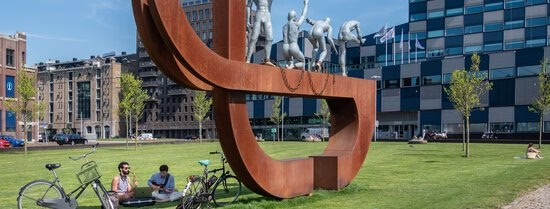July 1st marks the annual event of Keti Koti, a commemoration of the history of slavery in the Kingdom of the Netherlands and its colonies. On that day, not only the past is commemorated; it is also a celebration. July 1st, 1863, is the day that slavery was finally abolished across the entire Kingdom of the Netherlands. On the 30th of June, the evening prior to the Keti Koti celebration, a formal memorial gathering will take place at the Rotterdam slavery monument. President Professor Ed Brinksma and Chief Diversity Officer Professor Semiha Denktaş will lay a wreath on behalf of the Erasmus University.
The history of slavery is ever present today, especially in Rotterdam.
In a period of 250 years (1596-1863), according to the most conservative estimations and using the best available sources, around 60.0000 anonymous Africans were brought to North and South America as enslaved, by the people of Rotterdam.
There has been opposition to the system of slavery from the beginning of slavery. First of all from the enslaved people themselves, among others by Surinamese Maroons, and through many revolts, such as the most famous one led by Tula on Curaçao. But there were also protests from different groups from Rotterdam society.
One in eight of the people living in Rotterdam (in 2021) have ancestors that were once enslaved in the Atlantic area, more than any other city in the Netherlands. Colonial history has given both the descendants of the enslaved and the descendants of people of Rotterdammers who profited from the slave trade a two-sided, shared legacy. (Cf. Alex van Stipriaan, Rotterdam in Slavernij)
This is why it is important, as a university in the city of Rotterdam, to pay special attention to this day and to commemorate this history and legacy.
- Related content

